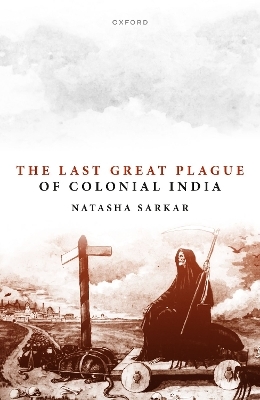
The Last Great Plague of Colonial India
Seiten
2024
Oxford University Press (Verlag)
978-0-19-887322-8 (ISBN)
Oxford University Press (Verlag)
978-0-19-887322-8 (ISBN)
This study examines the political, social, economic, and demographic dimensions of the plague pandemic which affected Colonial India in the late-nineteenth century. Natasha Sarkar details the progress of the disease within a complex colonial environment, exploring the attitudes and responses of indigenous communities and key colonial actors.
Plague has attained pandemic proportions on three occasions in recorded history. It is within the context of the third, modern pandemic that this book unfolds: an outbreak which took over twelve million lives in India alone.
Natasha Sarkar examines for the first time the full social history of this extraordinary medical crisis in India at the end of the nineteenth century, detailing the nature and progress of the disease within a complex colonial environment. Deep-seated colonial anxieties about governing India influenced and are disclosed in responses to the pandemic. Disease carriers were identified and labelled, and scapegoats stigmatized. Western Imperialism and its developments in biomedicine clashed with older indigenous medical systems.
Sarkar also considers attitudes, approaches, and mentalities in indigenous Indian society. She explores what individuals and communities made of the disease, and how social prejudices surrounding it and its sufferers became increasingly heightened in a colonial environment. The plague crisis reveals disparate, heterogeneous voices across communities--the contradictions of a multi-religious, multi-lingual, and multi-cultural society. The last great plague of Colonial India is thus portrayed in all its political, social, economic, and demographic dimensions.
Plague has attained pandemic proportions on three occasions in recorded history. It is within the context of the third, modern pandemic that this book unfolds: an outbreak which took over twelve million lives in India alone.
Natasha Sarkar examines for the first time the full social history of this extraordinary medical crisis in India at the end of the nineteenth century, detailing the nature and progress of the disease within a complex colonial environment. Deep-seated colonial anxieties about governing India influenced and are disclosed in responses to the pandemic. Disease carriers were identified and labelled, and scapegoats stigmatized. Western Imperialism and its developments in biomedicine clashed with older indigenous medical systems.
Sarkar also considers attitudes, approaches, and mentalities in indigenous Indian society. She explores what individuals and communities made of the disease, and how social prejudices surrounding it and its sufferers became increasingly heightened in a colonial environment. The plague crisis reveals disparate, heterogeneous voices across communities--the contradictions of a multi-religious, multi-lingual, and multi-cultural society. The last great plague of Colonial India is thus portrayed in all its political, social, economic, and demographic dimensions.
Natasha Sarkar is a commissioning editor and independent researcher who earned her PhD in History from the National University of Singapore. She has engaged with teaching and research across Asia and the United States for nearly two decades. A recipient of several awards and grants, including the Rockefeller Grant-in-Aid, she has to her credit several publications and articles on history, gender, and science.
Introduction
1: Outbreak
2: Colonial Designs
3: Indigenous Response
4: Remedies Aplenty
5: Missionary Zeal
6: Oh, Rats!
7: Rethinking Spaces
8: Shifting Priorities
9: Mortality Estimates
10: Final Musings
| Erscheinungsdatum | 09.05.2024 |
|---|---|
| Zusatzinfo | 64 black and white illustrations |
| Verlagsort | Oxford |
| Sprache | englisch |
| Maße | 160 x 240 mm |
| Gewicht | 624 g |
| Themenwelt | Geschichte ► Teilgebiete der Geschichte ► Kulturgeschichte |
| Geschichte ► Teilgebiete der Geschichte ► Wirtschaftsgeschichte | |
| Studium ► Querschnittsbereiche ► Geschichte / Ethik der Medizin | |
| ISBN-10 | 0-19-887322-0 / 0198873220 |
| ISBN-13 | 978-0-19-887322-8 / 9780198873228 |
| Zustand | Neuware |
| Informationen gemäß Produktsicherheitsverordnung (GPSR) | |
| Haben Sie eine Frage zum Produkt? |
Mehr entdecken
aus dem Bereich
aus dem Bereich
Die Revolution des Gemeinen Mannes
Buch | Softcover (2024)
C.H.Beck (Verlag)
CHF 16,80
vom Mittelalter bis zur Gegenwart
Buch | Softcover (2024)
C.H.Beck (Verlag)
CHF 16,80


